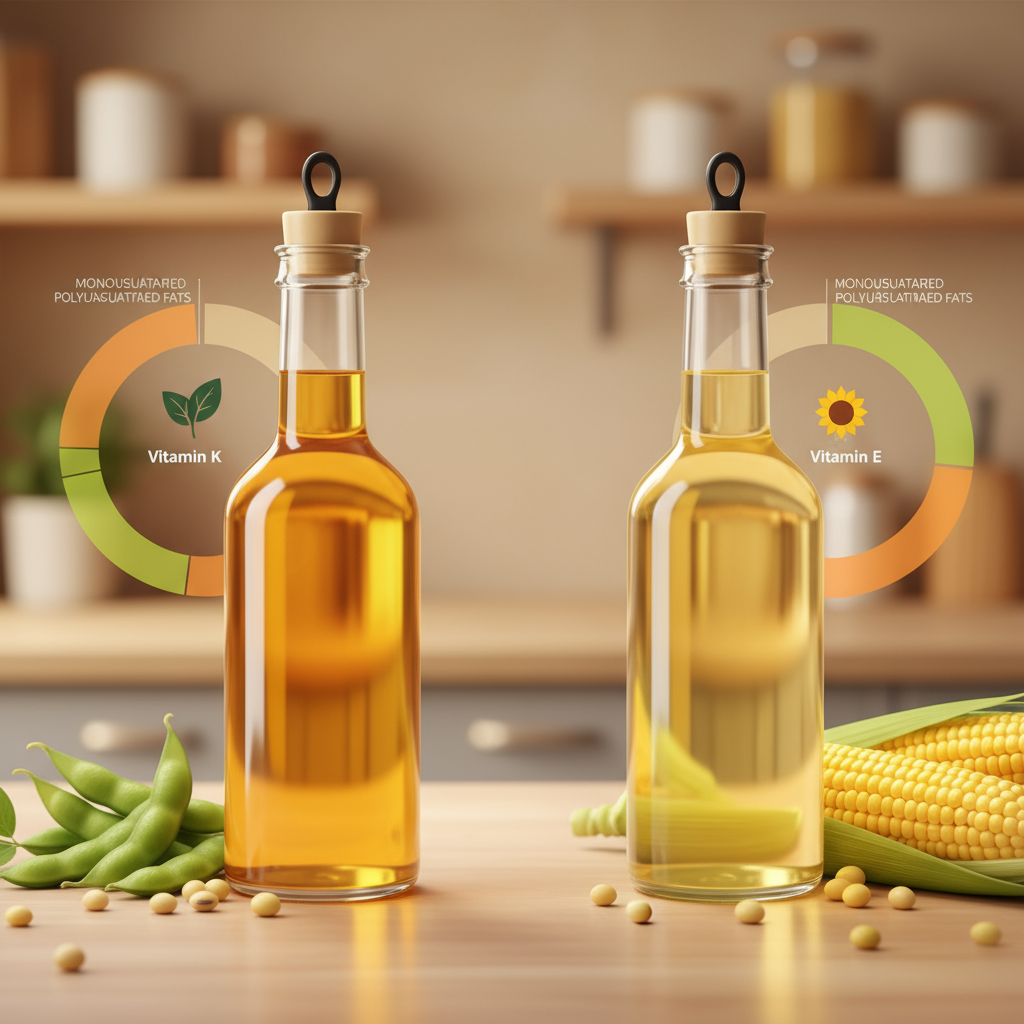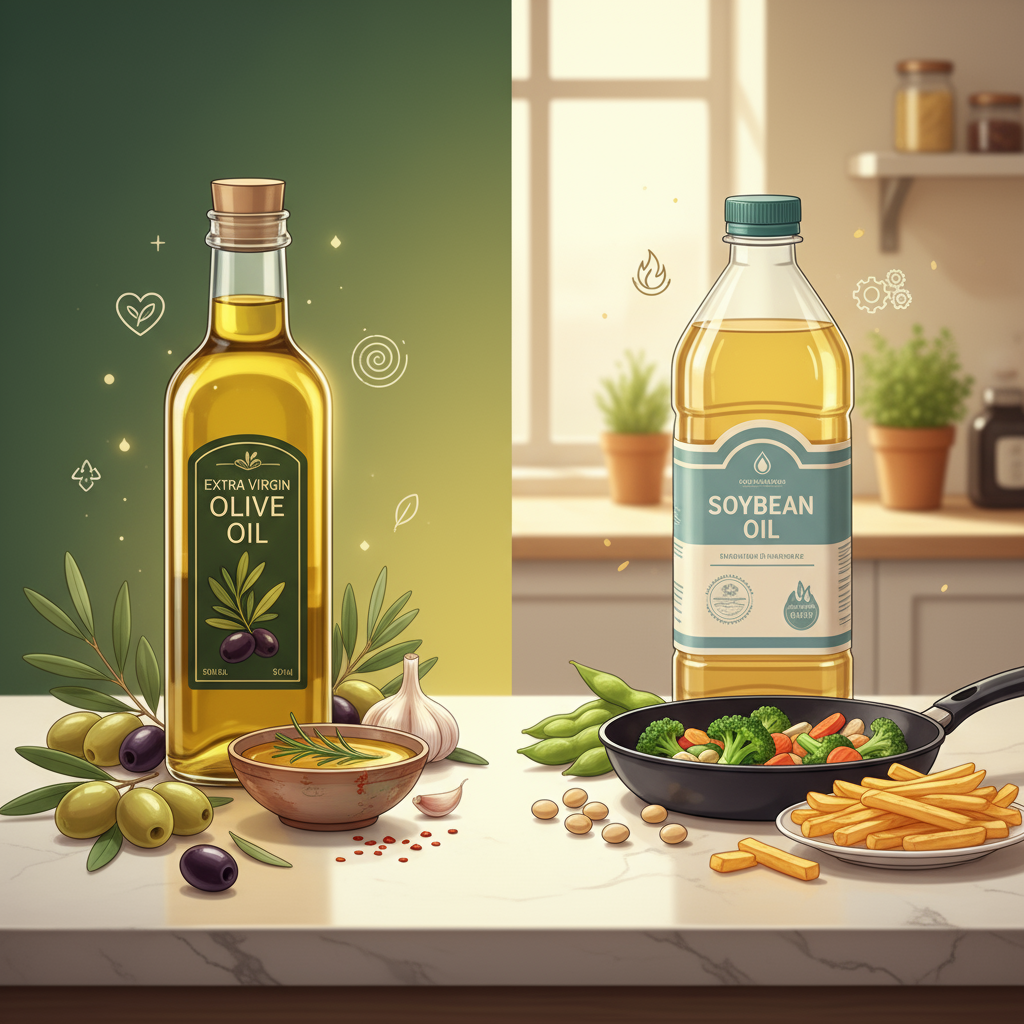
Soybean Oil vs. Corn Oil: A Comprehensive Comparison
TL;DR
Soybean oil and corn oil are two popular cooking oils, each with distinct nutritional profiles and health implications. Soybean oil is higher in monounsaturated fats and vitamin K, while corn oil boasts more polyunsaturated fats and vitamin E. Both oils are calorie-dense, but their fatty acid compositions and potential health effects differ significantly. This article explores these differences to help you make informed dietary choices.
Cooking oils are essential components of many diets around the world. Among the most common are soybean oil and corn oil, both of which are derived from widely cultivated crops. While they share some similarities, they also possess unique nutritional properties and health implications. This article will delve into the differences between soybean oil and corn oil, examining their health impacts, nutritional profiles, and potential uses in cooking.
Both soybean oil and corn oil are composed of nearly 100% fat, providing a high caloric content of approximately 884 calories per 100 grams for soybean oil and 900 calories for corn oil. A tablespoon of soybean oil contains about 120 calories, while corn oil has approximately 122 calories.
Fat Composition
When it comes to vitamins, both oils provide essential fat-soluble vitamins, but they differ significantly in their content:
Both soybean and corn oils are high in omega-6 fatty acids, which are essential for health but can promote inflammation when consumed in excess. The typical American diet is disproportionately high in omega-6s compared to omega-3s, with ratios often exceeding 14-20:1. This imbalance is linked to various inflammatory diseases.
Research suggests that excessive consumption of omega-6-rich oils, including soybean and corn oils, may have negative health effects. For instance, a study indicated that the chronic exposure to these oils could lead to behavioral changes and increased anxiety in animal models, suggesting that they may affect neurological health as well (Gao et al., 2019).
Given the high omega-6 content in both oils, it is advisable to limit their intake and seek alternatives like extra virgin olive oil, which is lower in omega-6s and has anti-inflammatory properties.
In summary, both soybean oil and corn oil have their unique nutritional profiles, with soybean oil being richer in vitamin K and monounsaturated fats, while corn oil offers more vitamin E and polyunsaturated fats. However, both are high in omega-6 fatty acids, raising concerns about inflammation and overall health when consumed in excess. Therefore, moderation is key, and exploring healthier alternatives may be beneficial for a balanced diet.
Soybean oil is higher in monounsaturated fats and vitamin K, while corn oil contains more polyunsaturated fats and vitamin E. Soybean oil has about 43% monounsaturated fats, whereas corn oil has roughly 54.7% polyunsaturated fats.
Both oils are high in omega-6 fatty acids, which can promote inflammation if consumed excessively. Research indicates that high intake of these oils may lead to negative health effects, including behavioral changes and increased anxiety.
Both oils are calorie-dense, with soybean oil providing approximately 884 calories per 100 grams and corn oil about 900 calories. A tablespoon of soybean oil contains around 120 calories, while corn oil has about 122 calories.
Yes, it is advisable to limit the intake of soybean and corn oils due to their high omega-6 content. Healthier alternatives include extra virgin olive oil, which is lower in omega-6s and has anti-inflammatory properties.

Is Soybean Oil Good for Skin? Exploring Its Benefits and Risks
TL;DR Soybean oil is a popular ingredient in skincare products due to its moisturizing, anti-inflammatory, and anti-aging properties. It is rich in essential fatty acids and vitamin E, making it beneficial for dry and irritated sk...

Is Soybean Oil Gluten-Free? A Comprehensive Guide
TL;DR Soybean oil, derived from soybeans, is naturally gluten-free and safe for individuals with gluten intolerance or celiac disease. While pure soybean oil contains no gluten, it is essential to check labels for any added ingred...

Soybean Oil vs Vegetable Oil: Understanding the Differences
TL;DR Soybean Oil: A type of vegetable oil derived specifically from soybeans. It is widely used for cooking and frying due to its high smoke point and neutral flavor. Vegetable Oil: Generally refers to a blend of various plant oi...

Olive Oil vs. Soybean Oil: Which is Healthier?
TL;DR When comparing olive oil and soybean oil, olive oil, particularly extra virgin olive oil (EVOO), is generally considered the healthier option. EVOO is rich in monounsaturated fats, antioxidants, and anti-inflammatory propert...
Ready to source an ingredient?
Whether you’re struggling to find the perfect ingredient, racing against the clock, or simply don’t have the bandwidth to manage sourcing — we’ve got your back.
Get a Free Sourcing AuditSavings is BIG but the relationship value is MASSIVE! Glad we met when we did. Looking forward to building this partnership with you and David.
Yohan, here to say you’re one of my favorite suppliers. Aside from your high quality ingredients, you’re so great to work with. Thanks for all the help you’ve given us this year.
Working with Global Savors and Yohan has been very smooth when sourcing ingredients. They offer a great selection and and cost savings! Yohan has been awesome to work with and we look forward to continuing business together.






Global Savors is your trusted partner for seamless ingredient sourcing, offering end-to-end solutions that streamline procurement, simplify logistics, and elevate your supply chain efficiency.
View More News
© 2026 Copyrights by Global Savors. All Rights Reserved

